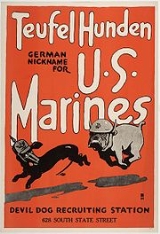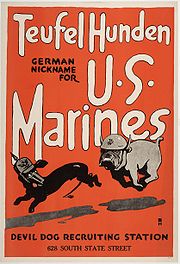
Devil Dog
Encyclopedia

German language
German is a West Germanic language, related to and classified alongside English and Dutch. With an estimated 90 – 98 million native speakers, German is one of the world's major languages and is the most widely-spoken first language in the European Union....
, is a motivational nickname
Nickname
A nickname is "a usually familiar or humorous but sometimes pointed or cruel name given to a person or place, as a supposedly appropriate replacement for or addition to the proper name.", or a name similar in origin and pronunciation from the original name....
for a U.S. Marine
United States Marine Corps
The United States Marine Corps is a branch of the United States Armed Forces responsible for providing power projection from the sea, using the mobility of the United States Navy to deliver combined-arms task forces rapidly. It is one of seven uniformed services of the United States...
.
U.S. Marine Corps legends
According to tradition in the United States Marine CorpsUnited States Marine Corps
The United States Marine Corps is a branch of the United States Armed Forces responsible for providing power projection from the sea, using the mobility of the United States Navy to deliver combined-arms task forces rapidly. It is one of seven uniformed services of the United States...
, the moniker was used by German soldiers to describe U.S. Marines who fought in the Battle of Belleau Wood
Battle of Belleau Wood
The Battle of Belleau Wood occurred during the German 1918 Spring Offensive in World War I, near the Marne River in France. The battle was fought between the U.S...
in 1918. The Marines fought with such ferocity that they were likened to "Dogs from Hell." Although unverified by the Germans, the reports were made by American media at the time. While the legend persists, the Devil Dogs nickname for Marines first appeared in newspapers in the United States in April 1918, about two months before the Battle of Belleau Wood. The La Crosse (Wisconsin) Tribune ran a story about the nickname on April 27, 1918, and other newspapers used the story as early as April 15, 1918. The Battle of Belleau Wood began on June 1, 1918.
Grammar problems
A poster created by Charles B. Falls in 1918 (exhibited further up) was one of the first recorded references to the term.In German, a compound noun is always a single word, so using two words "Teufel Hunden" is grammatically incorrect. The correct German would be Teufelshunde in nominative
Nominative case
The nominative case is one of the grammatical cases of a noun or other part of speech, which generally marks the subject of a verb or the predicate noun or predicate adjective, as opposed to its object or other verb arguments...
, genitive
Genitive case
In grammar, genitive is the grammatical case that marks a noun as modifying another noun...
, and accusative
Accusative case
The accusative case of a noun is the grammatical case used to mark the direct object of a transitive verb. The same case is used in many languages for the objects of prepositions...
cases, and Teufelshunden only in the dative
Dative case
The dative case is a grammatical case generally used to indicate the noun to whom something is given, as in "George gave Jamie a drink"....
. In either form, the linking element "s" steps between the words. Examples:
- Sie waren Teufelshunde. - they were devil dogs.
- Er war ein Teufelshund. - he was a devil dog.
- Er sprach von den Teufelshunden. - he talked about the devil dogs.
Furthermore, the word "Teufelshund" is unknown in the German language, and may possibly be an example of Denglisch
Denglisch
Denglisch or Denglish is a portmanteau of the German words Deutsch and Englisch. Used in all German-speaking and Dutch-speaking countries, it describes an influx of English, or pseudo-English, vocabulary into the German or Dutch language through travel and the widespread usage of English in...
. The nearest equivalent is "Höllenhund" ("dog of hell"), the German translation of the mythical Kerberos
Cerberus
Cerberus , or Kerberos, in Greek and Roman mythology, is a multi-headed hound which guards the gates of the Underworld, to prevent those who have crossed the river Styx from ever escaping...
; a term that can also be used to describe a reckless and courageous person. All this suggests that the Marines were never actually referred to as "devil dogs" by German WWI soldiers.
Modern use
The term "Devil Dog" is a very common nickname for all Marines. "Devil Dog" is historically a well-accepted term of endearmentTerm of endearment
A term of endearment is a word or phrase used to address and/or describe a person, animal or inanimate object for which the speaker feels love or affection...
, as a title of honor. The "dog" in the phrase is usually associated with the bulldog, in line with the original 1918 poster, such as the English bulldog
Bulldog
Bulldog is the name for a breed of dog commonly referred to as the English Bulldog. Other Bulldog breeds include the American Bulldog, Olde English Bulldogge and the French Bulldog. The Bulldog is a muscular heavy dog with a wrinkled face and a distinctive pushed-in nose...
being a common mascot in the Corps.
In contrast, the term has also taken on a negative connotation due to its usage when correcting Marines. The term "devil dogged" or "devil dogging" has come to mean lectured or otherwise reprimanded, prefaced with being called out as a "devil dog".

